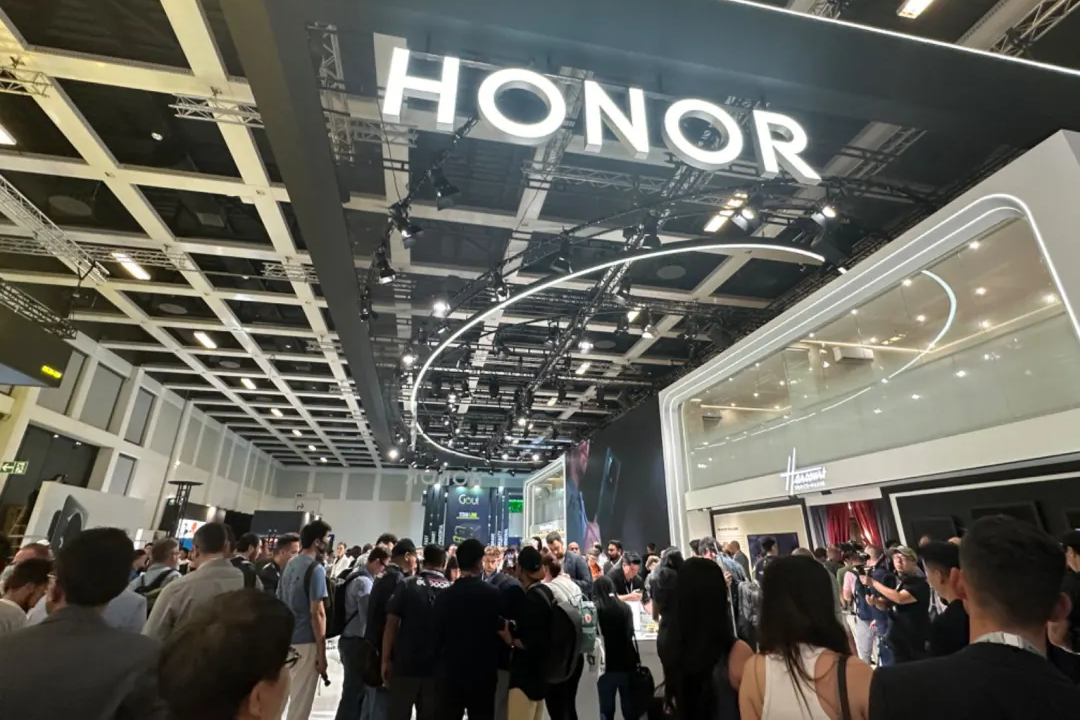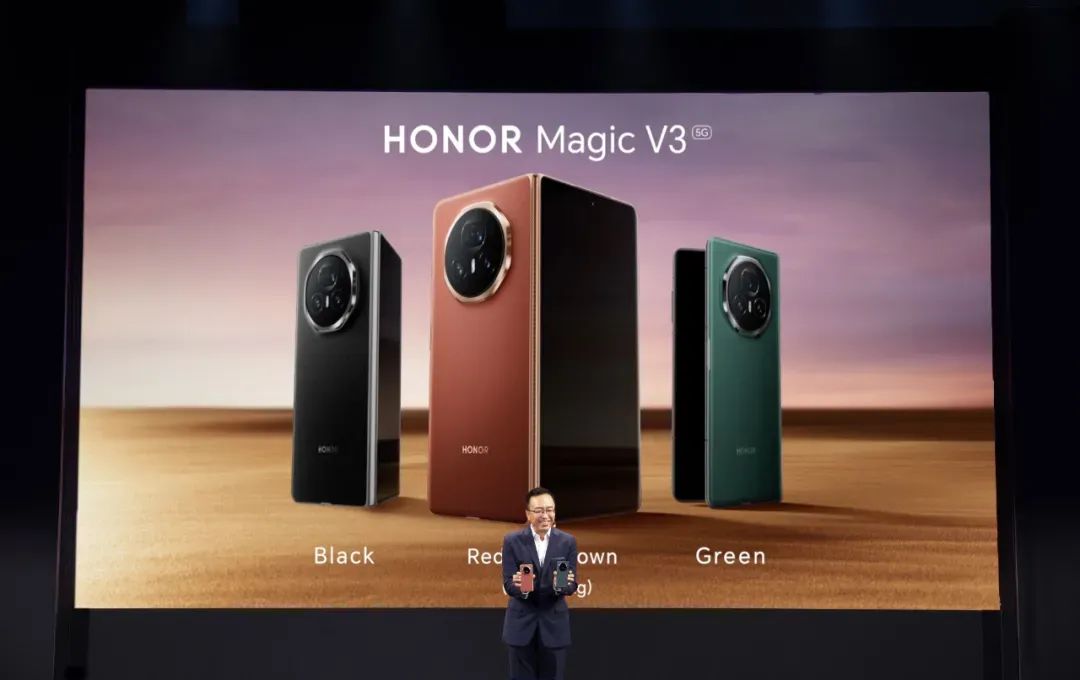Defeat Samsung, Honor becomes the world champion!
![]() 09/10 2024
09/10 2024
![]() 552
552

Written by | Huashang Taolüe Zhang Jingbo
The Chinese story is sweeping the globe.
Following "Black Myth: Wukong," another Chinese product has sparked heated debate in Europe and worldwide, potentially wielding even greater influence.
[Chinese Brand Crowned First in Europe]
"Amazing!"
When Honor CEO Zhao Ming dropped his Magic V3 phone onto the floor with a thud, the audience erupted in gasps.
This scene unfolded at the 2024 International Funkausstellung Berlin (IFA) in the German capital.
As one of the world's most influential consumer electronics exhibitions, IFA celebrated its centenary this year. The industry's attention was focused on this stage.
A foldable phone as thin as 9.2mm, delicate as a cicada's wing, fell from a height of over 2 meters. Even the product manager offstage broke out in a cold sweat, yet Zhao Ming remained calm and collected, because:
It was unscathed!
This is just one of the many surprises Honor has in store for global users.

As one of the pioneers of AI phones, the Magic V3 boasts powerful AI capabilities, including AI removal, real-time AI translation, and the exclusive built-in AI function Honor Arbitrary Door, among others.
The AI-powered, personalized operating system MagicOS also enables seamless cross-device and cross-system interactions, accurately understanding user intent and assisting with various scenarios through YOYO Assistant.
Its extreme thinness combined with robust AI innovations has refreshed the perceptions and experiences of many European users, propelling Honor's foldable phones to soar in the European and global markets.
According to the latest data from Counterpoint:
In Q2 2024, Honor surpassed Samsung to become the top brand in Western Europe. Globally, shipments of Honor's foldable phones surged 455% year-over-year, far outpacing other brands in growth rate.
Following Huawei's retreat, Chinese high-end phones have once again shone on the global stage, altering the market landscape in Europe.
Beyond foldable phones, Honor also unveiled the MagicPad2 tablet and MagicBook Art 14 laptop, the latter featuring a pop-up mobile camera that attaches and is ready for use instantly.
It is also Honor's first ARM PC equipped with a Qualcomm chip.
Compared to traditional PCs, the MagicBook Art 14 boasts powerful AI computing capabilities and utilizes AI technology to reimagine PC hardware from the ground up, delivering an experience that surpasses traditional PCs.
At the launch event, Zhao Ming teased the upcoming Magic7 series, Honor's next flagship, set to usher in a new era of AI phones with its integration of AI agents.
With AI agents, complex and time-consuming tasks like canceling subscriptions become as simple as a single command. This represents a qualitative leap in mobile phone experiences, as described by Honor China's CMO Jiang Hairong:
This will propel mobile phones into the era of autonomy!
2024 also marks the centenary of IFA. Upon meeting Zhao Ming, the IFA director joked, "For IFA's centenary, you must bring something amazing to support our show!"
The Mayor of Berlin also graced Honor's booth. German table tennis world champion Timo Boll interacted warmly with the audience at Honor's booth during a friendly match.
[Winning Global Respect Through Innovation]
Three years ago, when Honor first participated in IFA, it was still an obscure Chinese brand on the world stage.
Today, however, it has captured the spotlight at IFA, MWC, and other prestigious global consumer electronics exhibitions, earning the respect of users worldwide. The core logic behind this transformation boils down to two words:
Innovation!
When asked at IFA about Honor's sweep across Europe, Zhao Ming reiterated this point.
Before Honor, the European foldable phone market was virtually dominated by Samsung. As an early pioneer in the foldable category, Samsung had a strong foothold in this market.
Yet global users were hesitant to embrace foldable phones due to their perceived bulkiness compared to conventional phones.
When everyone assumed foldables were inherently bulkier, Honor shattered this industry perception and barrier. Through significant investments and repeated experiments, Honor relentlessly pursued the ultimate thinness for foldable phones.
From the Magic V2's initial achievement of under 10mm to the Magic V3's 9.2mm... Honor continually broke industry records in its relentless pursuit of excellence.
As a result, foldable phones became as sleek as conventional phones, if not more so, significantly driving their adoption.
According to Counterpoint, Honor has become the largest contributor to growth in the large-format foldable phone market in Europe.
While the mobile phone industry has struggled with innovation fatigue in recent years, Honor and Huawei are jointly leading the way in foldable technology.
In this process, Honor has accumulated extensive foldable technology, ranging from shield tunnel steel hinges to aerospace fiber materials... The Magic V3 alone boasts:
19 innovative high-performance materials and 114 microstructures.
These technological advancements have enabled Honor's foldable phones to set new industry standards for thinness and performance, positioning it to compete and even surpass rivals like Huawei and Samsung.
Ahead of Huawei's upcoming triple-folding phone launch, Honor CEO Zhao Ming shared with the media:
For Honor, creating a triple-folding phone poses no technical challenges; our technology reserves are robust.
Innovation extends beyond mere technological breakthroughs. The true challenge lies in strategic foresight and industry layout.
As early as 2016, Honor anticipated the dawn of the mobile AI era and introduced the concept with its Magic phone that year.
In 2018, the Magic 2 debuted with YOYO, a self-learning, self-evolving intelligent entity.
Through this journey, Honor's understanding of AI phones has deepened, leading to the formulation of a strategic vision centered around a four-layer AI architecture.
While other manufacturers relied on third-party large models for superficial AI applications, Honor completed a platform-level AI layout, fundamentally reimagining traditional operating systems with AI.
Coincidentally, Apple's recently unveiled Apple Intelligence shares a similar vision with Honor's four-layer AI architecture.
However, Honor's layout predates Apple's.
At IFA, Honor took the lead once again by unveiling the industry's first open-ecosystem AI agent—AI Agent—pioneering a new frontier.

The AI Agent serves as a personal life assistant, accurately recognizing user intent and autonomously executing complex tasks. With a simple drag, drop, or command, users can effortlessly manage various scenarios.
For instance, booking flights or canceling subscriptions with a single tap.
This level of innovation has consistently positioned Honor to earn the respect of European and global users, earning praise from media outlets like The Associated Press and CNBC.
In CNBC's view, Honor challenges Samsung in foldables and leads Apple in AI agents.
[Chinese Brands Sweeping the Globe]
For decades, Chinese brands followed in the footsteps of Western companies in terms of products and technology.
However, this dynamic has undergone a significant shift in recent years. From smartphones to new energy vehicles, Chinese brands are gradually leading global innovation.
At this year's IFA, we deeply felt this transformation.
Chinese brands, from TCL to Hisense and Haier, dominated IFA, occupying vast exhibition halls and showcasing dazzling new technologies.

Amidst the crowds, users and partners from Europe and worldwide flocked to these booths, expressing keen interest in the new technologies on display.
Honor's booth was particularly packed, with a steady stream of visitors experiencing its products and AI features. Even foreign YouTubers live-streamed from the scene.
This spectacle inspires profound reflections.
In 1997, when Chinese brand TCL first participated in Berlin's IFA, its booth measured a mere 30 square meters.
Today, Chinese brands have swept IFA, emerging as its brightest stars. Behind this transformation lies a heart-wrenching narrative of Chinese brands evolving from followers and imitators to global innovation leaders.
Yet, on-site observations also reveal gaps compared to Korean brands like Samsung and LG.
Despite narrowing or even surpassing competitors in technology and product design, decades of market position and brand reputation cannot be bridged overnight.
In this regard, Honor maintains a clear-headed approach and pace.
There can be no successful challengers without initial challenges, a mindset embodied by Honor CEO Zhao Ming.
In the past, Chinese brands lagged behind. However, decades of accumulation have gradually equipped us with the capability to challenge the likes of Apple and Samsung globally, with Honor leading the charge as a representative Chinese brand.
This daring spirit is reshaping the landscape of Chinese brands and poised to become a milestone.
All challenges ultimately fuel growth.
From leapfrogging in foldables to premiering AI agents ahead of Apple...
Chinese brands, epitomized by Honor, are transforming from challengers to successful challengers, sweeping the globe as industry leaders.
——END——
Welcome to follow [Huashang Taolüe] for insights into influential figures and tales of strategic brilliance.
All rights reserved. Unauthorized reproduction is prohibited.
Some images sourced from the internet.
For infringement issues, please contact us for removal.








